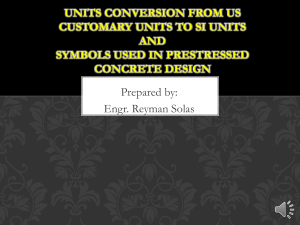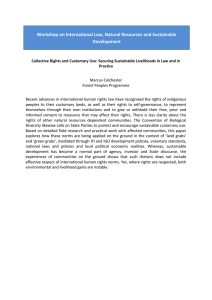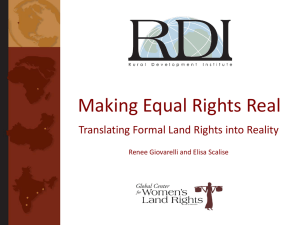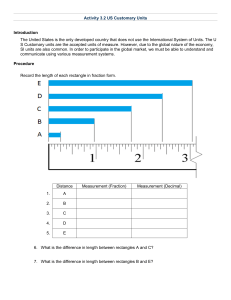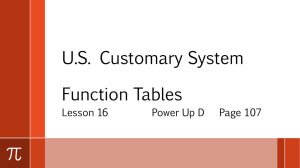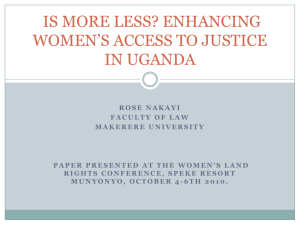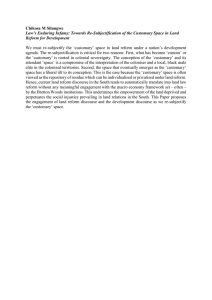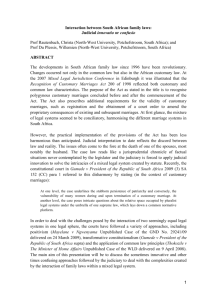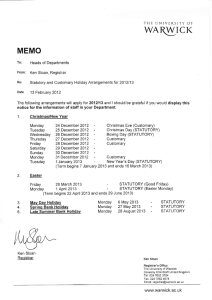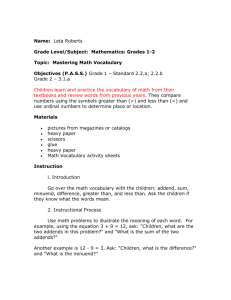Module 4: Land Policy and Administration (Rabley)
advertisement
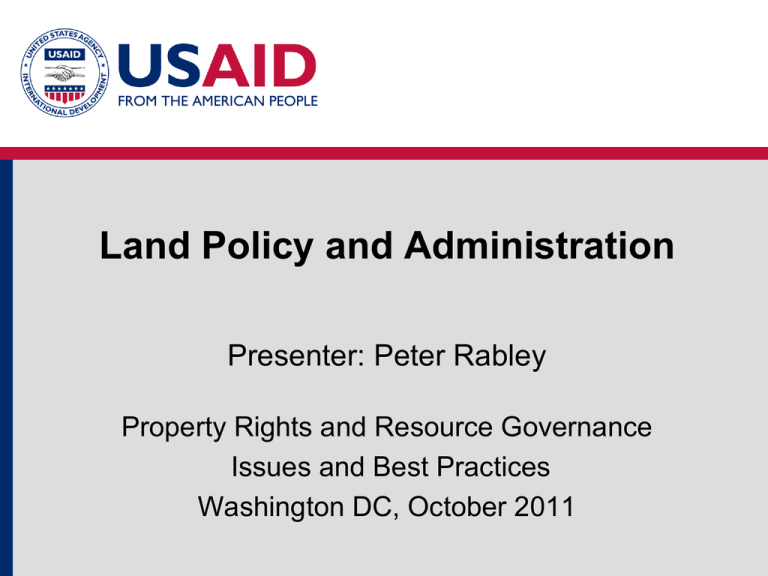
Land Policy and Administration Presenter: Peter Rabley Property Rights and Resource Governance Issues and Best Practices Washington DC, October 2011 Land Policy “Land policy lies at the heart of economic and social life and environmental issues in all countries.” Social Economic Policy Land Agriculture Guide – Inform – “soft” Legislation Institutional Reform “An official statement by a government of its intentions and plans regarding the conservation, use, and allocation of land, but does not have the force of law.” Continuum of Land Rights Land Policy 1996. Land Policy “ recognizes the finite nature of Country’s land resources and the need to correct decades of indiscriminate use and poor development practices. The policy aims to complement socio-economic development plans and programmes including poverty eradication, whilst challenging and seeking to remove inefficient, onerous and outdated legal, administrative, management and other barriers.” 1999 – PSMP 2001 – National Land Agency “July Policy Legislation Institutional Reform Land Policy Customary Tenure Forms (Pastoralists, ethnic, religious groups) Land redistribution Land consolidation Land divestment Land acquisition Increased Agricultural Productivity Protection for disadvantaged groups Land Policy Decentralization of services Improved Service Delivery Improved Food Security Post conflict Protection of Commons Peri urban/Urban – Housing/Shelter Biodiversity Protection Resource Management/protection Increased Investment Land Legislation International Treaties Regional Agreements National Constitutions National Laws “Act of making or enacting laws, usually by a legislature or other governing body” Statutory Law Customary Law Religious Laws (Sharia) Forest Harmonization-simplification Legislative Drafting Regulations Notaries Access Modernization (E-Commerce, E-Conveyancing, Digital Copyright/Public Access Transport Planning Environment Agriculture Health Signatures) Land Administration – Definition ‘THE PROCESS OF DETERMINING, RECORDING AND DISSEMINATING INFORMATION ABOUT OWNERSHIP, VALUE AND USE OF LAND, WHEN IMPLEMENTING LAND MANAGEMENT POLICIES’ (UN/ECE,1996). Land Administration Acts as a basis for sustainable development Sustain stability & economic development by recognizing all property rights that promote internal confidence between its people, its commercial enterprises and its government, Property rights are a major source of national wealth, Land Administration States that prosper promote widespread and secured ownership of property rights as a foundation of agricultural, social and economic policy, Protect rights of disadvantaged groups (particularly as value of land increases). “ This is the judgement of sober men Will be this long desired Registry Upon whose fond none can be cheated when They trade or trust on that security Which if it pass as it is now fitted The just are double blessed, the knaves outwitted” Andrew Yarranton ‘A Plain Dealer’s Prayer for a Registry’ 1660 England Land Administration – Toxic Paper “U.S. and European authorities find it difficult to believe that the fundamental cause of a recession could be a poorly paperized legal system. But in emerging markets, like the one I come from, the importance of paper is pretty obvious. Most of our people are poor and live in the anarchy of the shadow economy, where their assets and contracts are covered by paper that is endemically toxic: not recorded, not standardized, difficult to identify, hard to locate and with a real value so opaque that ordinary people cannot build trust in each other or be trusted in global markets. In the shadow economies of the developing world, credit paralysis is a chronic condition. So when I look at the recession that has started in the West—triggered by toxic paper—I feel right at home.” Hernando de Soto – Newsweek Feb 20 2009 Land Administration Access/Delivery of Service Understandable Procedure for Recognizing Rights Effective, Secure Documentation of Rights Protection against Infringement of Rights by Others A Public Record of these Rights so Others Know Records Complete and Incontrovertible Proof Convenient Methods for Transferring Effective Procedures for Preserving the Written Record Land Administration: Good Governance Challenges Customary Recognition Capacity Migration Transparency/Doc Equity/Abuse Authority Figure recognition/disputes Boundaries Statutory Centralization Lack skilled/well paid pers. Barriers to entry high Data/Standards/Complete Power Elite Institutional competition/complexity Outdated land legislation Lack of maintenance/funding Private Sector Value added products | Professional organizations |Services Possible Interventions Develop and maintain a land policy Modernize/simplify/harmonize legislation Public Sector Modernization Capacity Building – Statutory and Customary Develop private sector capacity – surveyors, lawyers, realtors, assessors etc. More inclusive and flexible approach to Customary Tenure forms Rights based approach → move incrementally along the continuum of tenure Flexible cadastral systems Spatial Information → key to land administration - NSDI Points to Consider 15
